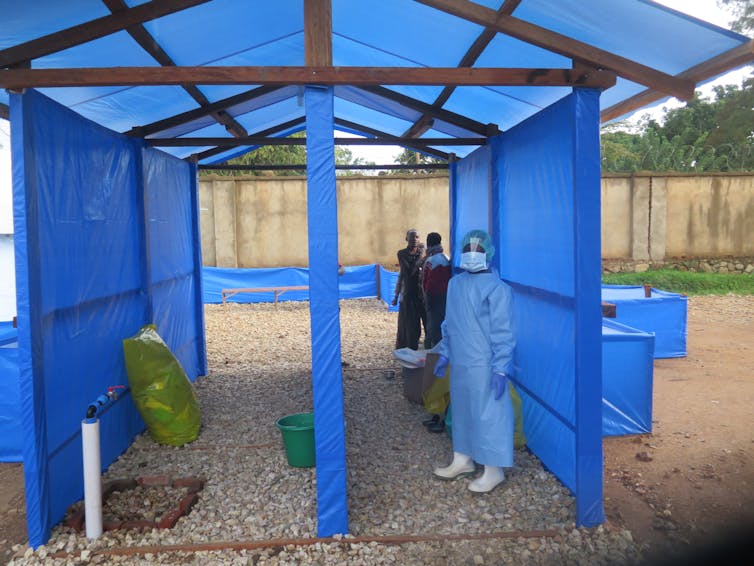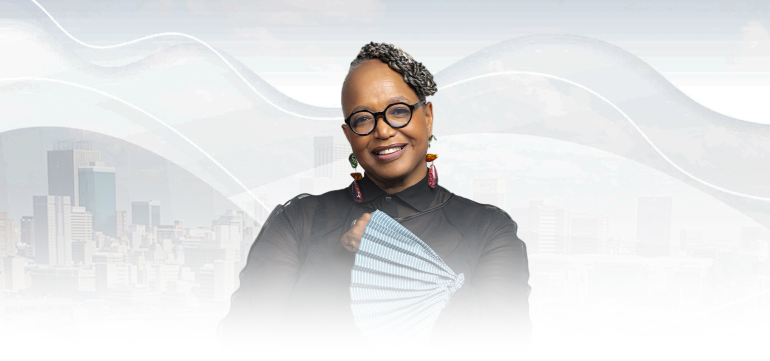Why it’s hard to stop Ebola spreading — between people and across borders
By: Janusz Paweska, National Institute for Communicable Diseases

Flickr/MONUSCO Photos
Ebola has claimed around 1400 lives in the Democratic Republic of Congo while there are reports that two people have lost their lives in western Uganda. The Conversation Africa’s Ozayr Patel asked Janusz Paweska about how the disease has spread and what can be done.
How is Ebola spread between human beings?
The source of primary human infection with Ebola virus are wild animals. The exposure takes place during unprotected hunting and processing of infected wild animals for meat consumption. This includes close contact with their infected blood, secretion and organs. In central equatorial Africa, bush meat is viewed as a major prize. This includes monkeys, chimpanzees, gorillas, bush pigs, forest antelopes (duikers), chevrotains, pangolins, civets and bats. Some particular species of fruit bats are considered the possible natural hosts for Ebola virus.
Once the Ebola virus is introduced into a human body, it replicates at very high concentrations in almost all organs and tissues. After an incubation period ranging from 2 to 21 days, it spreads by human-to-human transmission. This happens through direct contact – such as unprotected broken skin or mucous membranes – with blood, secretions or other bodily fluids (faeces, vomit).
Burial ceremonies where family members and other mourners have direct contact with the body of the deceased person can play a role in transmission. Direct contact with contaminated beds, bedding, and cloths can also be a source of infection. Another risk is sexual transmission. To reduce the risk, male survivors of Ebola should practice safe sex and hygiene for 12 months from the onset of symptoms or until their semen has tested negative twice for Ebola virus.
Healthcare workers can become infected while taking care and treating Ebola patients through close contact without the use of adequate infection control precautions and adequate nursing procedures. For example, when not wearing gloves, masks or goggles and gowns.
What steps can Uganda take to ensure that the disease is controlled and doesn’t spread?
The spread of Ebola across international borders is of a great concern. But it’s not surprising that the epicentre of the Ebola outbreak is in the highly unstable northeastern part of the DRC (North Kivu and Ituri provinces). The area is deeply troubled with high levels of social disruption caused by war and internal civil conflict resulting in widespread violence. This has included attacks on healthcare workers make implementing outbreak control measures, in addition, people move around in the region a lot and borders are porous between North Kivu province of the DRC and neighbouring countries. This has always meant that the potential for Ebola to cross the border has been high.
Uganda has had incidents of Ebola before. Previous outbreaks occurred in 2000 (425 cases with 224 deaths), 2007 (149 cases with 37 deaths), and 2011-2012 (25 with 21 cases). All these led to Uganda developing local diagnostic capacity which is now being used for rapid diagnosis of imported cases from DRC.
Measures and strategies to control the Ebola outbreaks are in place in the country. These include social mobilisation, health education and psychosocial support, case management and funerals (safe burials, patient screening, barriers and nursing). Other measures include surveillance and laboratory testing as well as contact tracing, sample collection and transport, reporting and analysing results, logistics and security. Mobile response teams have also been mobilised. These measures need high levels of coordination and community engagement.
The Ugandan Ministry of Health and the World Health Organisation are taking all the necessary measures to contain the outbreak and prevent further spread. This includes vaccination and deployment of more resources. Mass gatherings, market days and prayers in areas at risk have been cancelled. And a mobile response team has been deployed to the affected border area of Uganda.
What can neighbouring countries to do keep themselves safe?
Rwanda, South Sudan, and Uganda have been on high alert since the ongoing outbreak of Ebola was officially declared on 01 August 2018 in the DRC. Health border control measures – like screening body temperature – have been put in place as well as outbreak control and response measures.
Should people avoid travelling to the DRC and Uganda for the moment? What precautions should be taken?
So far, there are no travel restrictions to either country. But travellers should take general precautions by avoiding:
- contact with sick or dead people;
- contact with wild animals, including dead animals, and particularly monkeys, chimpanzees, gorillas, duikers, chevrotains, pangolins, and bats;
- consumption of bushmeat and make sure that animal products (blood and meat) are thoroughly cooked before consumption;
- unprotected sex; and
- visiting any caves.
Symptoms of infection will emerge 21 days after a person has been in contact with the virus. Symptoms could include fever, headache, weakness, muscle pain, diarrhoea, abdominal pain, vomiting and bleeding. All contact with others should be avoided, and medical help sought immediately.![]()
Janusz Paweska, Head of the Center for Emerging and Zoonotic Diseases, National Institute for Communicable Diseases
This article is republished from The Conversation under a Creative Commons license. Read the original article.
Written by: Natasha
Similar posts
MORE ARTICLES

Five killed in KZN crash allegedly caused by Polo driver

From Benin to the world: Kidjo makes history as first black African on Hollywood Walk of Fame

Drama, cheating and Surprise guest: RHOD reunion delivers shocking revelations

Why Waterfall Estate’s 99-year lease is practically forever

Theo Kgosinkwe opens his heart to wife Vourne in heartfelt post
QUICK LINKS
UpComing Shows

On the Beat
On the Beat with George Manyosi on Kaya 959. Saturday's, 18pm-21pm.
close
Touch of Soul
With T Bose
Kaya 959 takes back Sundays with A Touch of Soul, the only show bringing you soul and RnB music that touches your mind, body and spirit. The Best T in the City, T-bose takes you back to a time when music was made to last. A Touch of Soul is the perfect wind-down to your weekend. Sundays 14h00 to 18h00.
close
The Jazz Standard
with Brenda Sisane
The Jazz Standard with Brenda Sisane. Sunday's 12:00-15:00.
close
Spade of Hearts
With Xola Dlwati
WITH XOLA DLWATI: SATURDAYS 12:00 -15:00 Spade of Hearts is a fuse of love and soulful sounds, pulling at your heartstrings. Tune in for songs that will take you down memory lane. It is the sound that once dominated your playlist. It airs Sundays 12:00 – 15:00.
close
The World Show
With Nicky B
The World Show is informative, expansive, and largely pan-African. This is a musical journey that bridges generations and genres, travelling across continents and timelines, with in-depth interviews and features. ‘The World Show’ is a four-hour global journey through sound – featuring the freshest tracks from home and afar.
close
959 Music Weekdays
Kaya 959 Hits
Real. Familiar. Memorable. Kaya 959 brings you the music you know and love from our playlist. Uninterrupted. Thursdays 20h00 to 21h00
closeConnect with Kaya 959
DownLoad Our Mobile App
© 2025 Kaya 959 | On The Street On The Air








